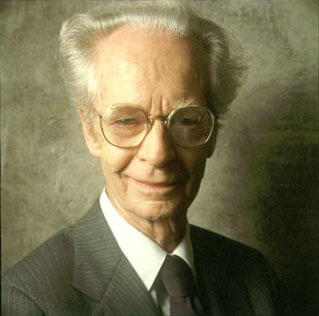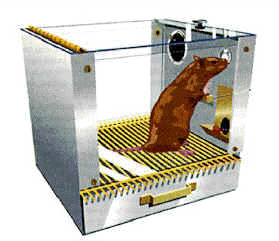|
|
 |
|
B. F. Skinner, Clark Hull, Edward Tolman, Albert Bandura, Julian Rotter
|
 |
|
NeoBehaviorism
Among many other neobehaviroists (Tolman, Guthrie, Hull) Skinner became the driving force in the second
phase of the school of Behaviorism with his theory of Operant conditioning. The neobehaviorist drive began at about 1930
and ended at about 1960, when the next evolution of Behaviorism would take place. During this first evolution of
Behaviorism a new characteristic was introduced, Operationism. Operationism allowed for language and terminology in psychology to be more scientific. Operationism also holds
that the validity of any scientific finding or theoretical construct depends on the validity of the operations used
in arriving at that finding.
B. F. Skinner’s entire system is based on Operant Conditioning.
The organism is in the process of “operating” on the environment. During this “operating,” the organism
encounters a special kind of stimulus, called a reinforcing stimulus, or simply a reinforcer. This special
stimulus has the effect of increasing the "Operant," this means the behavior is occurring just before the reinforcer. This
is operant conditioning: “the behavior is followed by a consequence, and the nature of the consequence modifies
the organisms tendency to repeat the behavior in the future.”
Tolman, Hull, and Bandura fed off of Skinner's theory and reproduced it with minor modifications. Tolman
had the Stimulus-Organism-Response theory, Hull believed that we have drives that control us, and bandura produced the
Modeling theory. Tolman's theory introduced the organisms role into the stimulus-response theory, Hull's theory was
that we all have an innate drive to maintain a normal state of being and an imperfect balance would lead us to seek the necessary
element to restore balance. Bandura's theory of modeling stated that we learn from watching the consequences of others
instead of the consequences happening to us. Bandura and Julian Rotter were of the second evolution of behaviorism known as
sociobehaviorism which began after the 1960s and still exist today. The core principles of sociobehaviorism were to incorporate
the cognitive processes into behavior and to not be as radical as Skinner with his beliefs that mental/cognitive processes
do not play a role in behavior. Rotter's contributions to behaviorism were his social learning theory and his locus of control.
To learn more about sociobehaviorism visit this site:
|
 |
|
|
|
 |
 |
|
| B. F. Skinner |

|
The Decline of Behaviorism
Since the development of cognitive psychology, which appears also to
offer an 'objective' approach to the study of the human psyche, behaviorism has generally dropped out of favour. Nevertheless,
it seems reasonable to say that behaviourism does appear to have revealed in its investigations of conditioning some universal
mechanisms by which we detect and store information about our environment. It is also the case that the more recent developments
of 'connectionism' have tended to lend support to some of behaviourism's principles, demonstrating as they do that connections
in more or less randomly wired networks become strengthened as a result of their experience of reinforcement.
One problem with behaviorism is that its mechanistic explanations of
human behavior. Another problem is that the claims made to explain the phenomena of behaviorism were often simply too ambitious
(for Skinner mostly). Skinner questioned 'not whether machines think, but whether men do'. I guess one might admire a
researcher who insists on starting with a clean slate in such a manner and taking nothing for granted, but to most of us,
questioning whether we think, whether we have beliefs, values and emotions is just plain unnecessary.
| Skinner's Box |

|
|
 |
|
|
|
|

Behaviorism
|
|
|
 |

